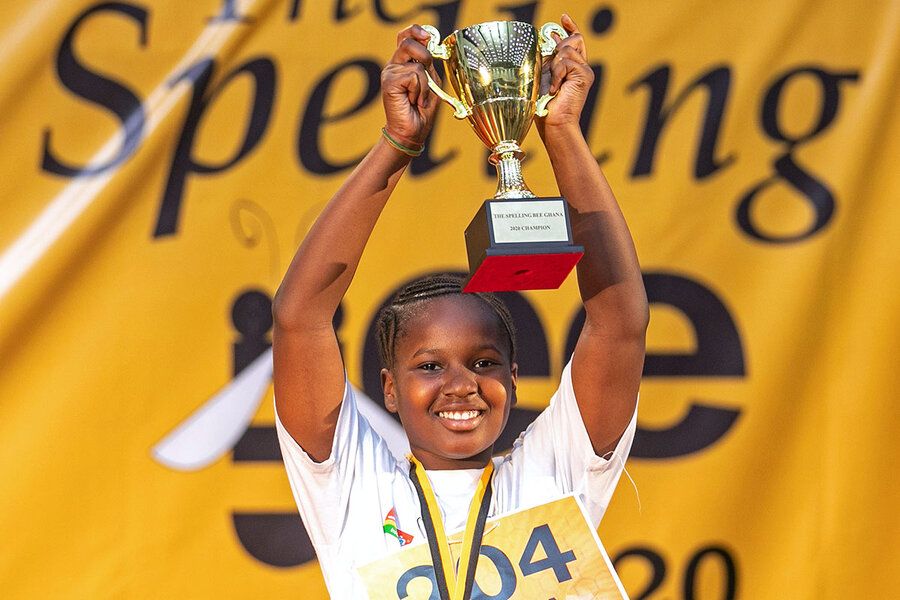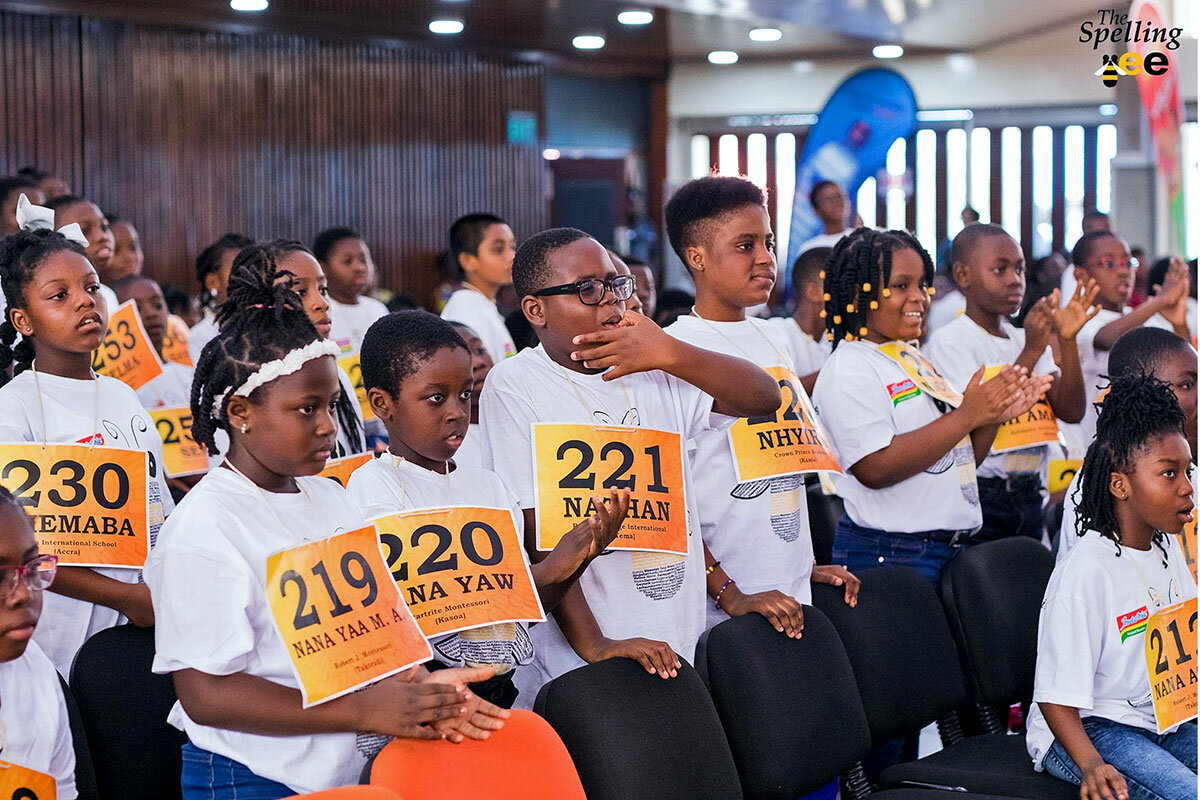This African champ spells success e-m-p-a-n-o-p-l-y
Loading...
| Johannesburg
Empanoply.
Definition: to dress in a full suit of armor.
E-M-P-A-N-O-P-L-Y, Empanoply.
Why We Wrote This
The Scripps National Spelling Bee seems like the quintessential American tradition. But like so many parts of life in the U.S., if you look a little closer, there’s an international story to be told – one letter at a time.
It was a fitting word to send a champion into battle, and that’s exactly what it did Saturday, when 11-year-old Nadia Chelpang Mashoud rattled off those nine letters to clinch her victory as Ghana’s 2020 national spelling bee champion.
“I was so happy – I was actually overwhelmed with happiness,” Nadia says, remembering the moment when she realized she’d taken the title.
Every year, across the United States, more than 10 million precocious American children stuff their heads full of prefixes and suffixes, etymology and root words. A suit of armor, if you will, for the battle that is a spelling bee.
Of these, just a few hundred will make it to the pinnacle of their sport – the Scripps National Spelling Bee, held each spring in Washington, D.C., where they’ll compete for the chance at $50,000 and a quirky kind of American fame. (Jimmy Kimmel, for instance, hosts the winner most years on his show for a spelling showdown against … himself.)
The American finalists are joined by a small number from abroad, including exactly one African speller. Ghana’s national spelling bee is currently the continent’s only Scripps qualifier, a fact the tournament’s organizer Eugenia Tachie-Menson says makes them a certain kind of ambassador.
“The image of Africa lots of people in America grow up with is hungry, skinny kids with flies stuck to their faces, and then we show up with kids who can compete with the best spellers in the world,” she says. “That changes minds.”
It’s also a reminder that English belongs to the world – and in particular, that it belongs to Africa. Today, there are more English speakers in Nigeria alone than in England itself. (Nigeria, indeed, has more English speakers than all but four other countries in the world.) In total, about 130 million Africans speak English, with many more speaking the English-based creoles and pidgins that African communities created as they stretched and bent the old colonial language to meet their own linguistic needs.
But few people – not just in Ghana or Africa, but anywhere in the world – speak English with quite the finesse of Ghana’s new top speller.
Take, for example, her favorite word.
“Triskaidekaphobia,” Nadia tells the Monitor’s reporter, and before that reporter can even sheepishly ask for the spelling, she’s off. “T-R-I-S-K-A-I-D-E-K-A-P-H-O-B-I-A,” she recites, “the fear of the number 13.”
Again, a fitting word for the winner of Ghana’s 13th annual national bee. The competition has been running since 2008, and now draws more than 7,000 competitors annually in its regional qualifiers, Ms. Tachie-Menson says.
But Nadia is the first winner from the country’s northern region, which has historically lagged behind other parts of the country in literacy and education levels.
In that way, Nadia isn’t all that different than her fictional heroine Akeelah Anderson, the title character of the 2006 American film “Akeelah and the Bee,” which follows an African American girl from inner-city Los Angeles as she fights her way to the final round of the national spelling bee.
“I was inspired by Akeelah’s determination to win,” Nadia says, even as she’s already begun to serve as inspiration herself.
“You’ve got to remember that in this part of Ghana … it’s a very patriarchal sexist society,” says Mariama Alhassan, director of Alhassan Gbanzaba Memorial School in the city of Tamale, where Nadia is a sixth grader. “And so therefore her victory is huge. The ripple effect of it is so wide.”
But for a kid like Nadia, who dreams of becoming a doctor or engineer, and says she loves math and science as much as English – why devote so much time to what, let’s face it, seems a bit of an esoteric pursuit?
Ms. Tachie-Menson says that even – perhaps especially – in the age of autocorrect and spell check, spelling bees actually have a lot of practical value for the students who compete.
“At the heart of it, it’s about teaching people to communicate effectively,” she says. Not to mention, “you learn grace and grit under pressure – skills that everyone in this world needs” whether they intend to spell their way through it or not.
For Nadia, of course, there are tangible benefits as well. In May, she’ll travel to Washington, D.C. – her first trip to the United States – where she’ll not only compete in the Scripps Bee, but also be feted by the Ghanaian ambassador and the local Ghanaian community. She’s looking forward to seeing the Smithsonian museums, she says, and to meet her competitors from across the ocean.
“I’m most excited because I’ll be meeting children from America and making new friends,” she says. And then, of course, she’ll suit up for battle – make that, she’ll empanoply – and show her new friends just what a Ghanaian spelling champion can do.







